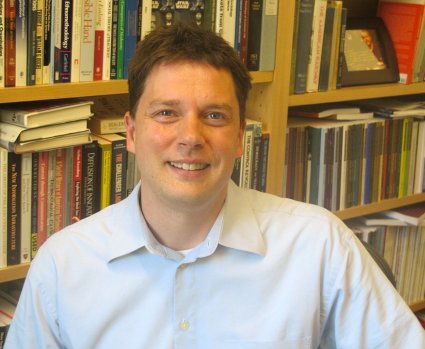EUGENE, Ore. — (Aug. 7, 2013) — Although librarians adopted Internet technology quickly, they initially dismissed search engines, which duplicated tasks they considered integral to their field. Their eventual embrace of the technology required a reinvention of their occupational identity, according to a study by University of Oregon researchers. The story of the successful transition — of accommodating a new technology — into a new identity is a good example for professionals in other fields who have faced or currently face such challenges, says Andrew J. Nelson, a professor of management and the Bramsen Faculty Fellow in Innovation, Entrepreneurship and Sustainability in the UO's Lundquist College of Business.
The story of the successful transition — of accommodating a new technology — into a new identity is a good example for professionals in other fields who have faced or currently face such challenges, says Andrew J. Nelson, a professor of management and the Bramsen Faculty Fellow in Innovation, Entrepreneurship and Sustainability in the UO's Lundquist College of Business.
"We not only found that new technologies can disrupt occupations, which others have found before, but showed how members of an occupation can redefine themselves in relation to the technology to maintain a new role and a new relevance in society," Nelson said.
Librarians, the researchers found, have gone from thinking of themselves as the knowledgeable person with the best answer to a patron's question to being an interpreter and connector who points patrons to helpful materials for their consideration.
►AUDIO: Nelson discusses the study's main findings (44 seconds)
The findings are in a study placed online ahead of regular publication in the Academy of Management Journal. Nelson and co-author Jennifer Irwin, a former librarian and now a business professor at Louisiana State University in Baton Rouge, analyzed 22 years of journal articles — 199 in all — written by and for U.S.-based librarians about the Internet.
Early on, the researchers wrote that: "Librarians initially described Internet search technology as a niche and emphasized their own unique (and superior) value." The emerging technology was dismissed, Nelson said, "as something that wasn't going to spread and be widely used." But that idea began to fade as more than 70 online search engines emerged between 1989 and 2011.
Nelson and Irwin defined occupational identity as an overlap between "who we are" and "what we do" as they explored the "paradox of expertise" in which librarians failed to grow their informational prowess with an emerging technology. "What made us curious about what happened was that librarians had technical skills — many had been building online databases of their collections with search capabilities very similar to what search engines aimed to develop," Irwin said. Yet librarians, the researcher said, had misinterpreted the possibilities of Internet searching for such information.
For her doctoral dissertation, Irwin had focused on technological change in American libraries over about 150 years. This project was a side road for her as part of the management department's philosophy of pairing graduate students with non-supervising faculty for an outside project to broaden their education.
--------------------------
 ► Watch a July 2012 video of Irwin, discussing her dissertation and experience earning a doctorate in management at the University of Oregon's Lundquist College of Business.
► Watch a July 2012 video of Irwin, discussing her dissertation and experience earning a doctorate in management at the University of Oregon's Lundquist College of Business.
--------------------------
The research was able to document a four-step transition, beginning with librarians "dismissing the technology as something that wasn't going to spread and be widely used," Nelson said. Next librarians began to differentiate themselves, accepting Internet searches as a way to provide simple answers because they preferred to interpret web-based search information for patrons.
Eventually, Nelson said, librarians decided to capture the technology and offer their expertise in collaboration with companies that were generating search engines, but the companies chose to go their own way.
Finally, librarians "evolved their approach" by working to develop scholarly-based search engines, such as Google Scholar, and others tied specifically to library holdings. "Really we find librarians, at this point, redefining their identity," Nelson said.
"So often we view technologies as having a life of their own," he said. "The technology appears and, therefore, the application is obvious, including the way that it is simply going to supplant or replace workers. This paper shows that idea is a vast oversimplification and, in fact, not wholly the truth. If we look deeply into this case of the Internet and how librarians responded, there was much more ability for the people themselves to react and to shape the path of this technology."
In their conclusion, Nelson and Irwin wrote: "In turn, the re-creation of occupational identity is one process through which technology can both challenge and reinforce, extend, or establish professionalization." There have been professions that have found no room to maneuver their strategies to do and disappeared: elevator operators, bowling-pin setters and street-lamp lighters.
About the University of Oregon
The University of Oregon is among the 108 institutions chosen from 4,633 U.S. universities for top-tier designation of "Very High Research Activity" in the 2010 Carnegie Classification of Institutions of Higher Education. The UO also is one of two Pacific Northwest members of the Association of American Universities.
Media Contact: Jim Barlow, director of science and research communications, 541-346-3481, jebarlow@uoregon.edu
Source: Andrew Nelson, assistant professor of management, 541-346-1569, ajnelson@uoregon.edu
Additional Links:
Follow UO Science on Facebook: http://www.facebook.com/UniversityOfOregonScience
UO Science on Twitter: http://twitter.com/UO_Research
More UO Science/Research News: http://uoresearch.uoregon.edu
Note: The University of Oregon is equipped with an on-campus television studio with a point-of-origin Vyvx connection, which provides broadcast-quality video to networks worldwide via fiber optic network. In addition, there is video access to satellite uplink, and audio access to an ISDN codec for broadcast-quality radio interviews.